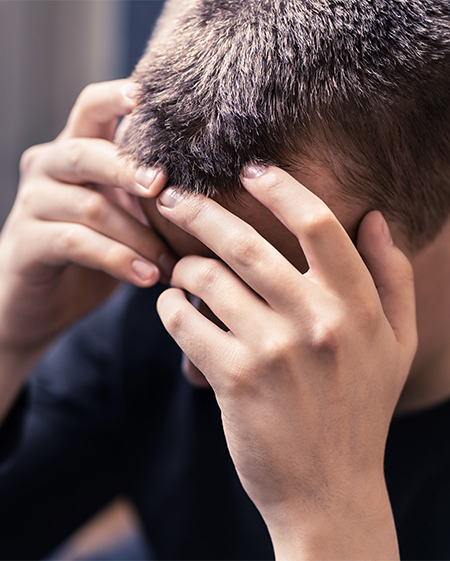 Teen trauma is challenging to face
Teen trauma is challenging to face
Parents and children can become overwhelmed by traumatic events and their consequences. Parents must be courageous in taking the first step to address trauma within the family. It isn’t easy for anyone.
For a parent, the long-term effects of teen trauma are jarring to experience. You want to protect your teen and ensure their safety and happiness. When you see your child suffering, it hurts.
At Blue Collar Counseling we deeply understand and are here to help.
Facing teen trauma is the best approach
Healing from teen trauma is possible once you face it. Know that you are not alone in the struggle.
Teen trauma is not rare. Research shows that nearly 70 percent of teens have experienced exposure to at least one traumatic event in their lifetime and roughly 30 percent of those have experienced more than one traumatic event.
Considering teenagers’ challenging lives, these numbers are not surprising. Adolescence is a time of transition and growth and is also a time when risk-taking behaviors manifest. Furthermore, teens experience exposure to the world on a larger scale. Often, they are unequipped to safeguard themselves in new situations and can become injured due to their vulnerability and inexperience.
Accidental trauma can occur, for example, if a teen is badly injured or witnesses a life-threatening incident. However, unintentional trauma is only one of the many kinds of teen trauma. Teen trauma also includes physical violence, sexual assault, emotional distress and mental suffering. The traumatic experiences that a teen endures can often result in Post-Traumatic Stress Disorder (PTSD).
 Teen trauma can cause PTSD
Teen trauma can cause PTSD
The symptoms of PTSD include panic attacks, nightmares, flashbacks, avoidance syndrome and incongruous fear.
PTSD is a complex way of describing the long-term consequences of traumatic events. Some of these traumatic events happen only once, like the death of a loved one or a bad car accident. However, some traumatic events occur repeatedly. Ongoing teen trauma can include child abuse, bullying and sexual abuse. Repetitive cases of teen trauma can be particularly damaging.
Traumatic events can generate an overwhelming sense of terror and helplessness. It’s hard when a teen has PTSD. The traumatic feelings can become triggered which causes a re-experiencing of that event over and over. Even though the traumatic event is in the past, the painful symptoms remain.
Effective treatment requires the courage to go behind the curtain of silence. Parents need to ask hard questions, such as: How severe is the teen’s trauma? How did your family respond to the traumatic event? Did you underestimate the long-term effects of the trauma on your child?
No one should face these questions without support
It is essential to have help to guide you and your family toward healing.
Blue Collar Counseling understands how hard it is to see a child in pain. Caring, professional treatment can ease you and your child into the healing process. Once your child feels secure the real work of recovery can begin.
Understanding the symptoms of teen trauma is essential. Gaining understanding means parents need to know the signs.
After a traumatic event, PTSD can take many forms. Learning the signs and symptoms of trauma is essential for parents of teens.
The following are some signs and symptoms of PTSD
Fear and Trepidation – They feel that something terrible will happen again and worry that the effects of the trauma will never go away.
Worry and Anxiety – They feel nervous and overwhelmed in everyday situations. PTSD anxiety often comes out of nowhere. Constant worrying can paralyze a teen.
Avoidance – They actively avoid people, places and things associated with a traumatic event.
Rage and Angry Outbursts – Aggressive, angry behavior is typical. Such behavior can include screaming or threats of physical violence.
Shame and Guilt – Traumatized teens often blame themselves, leading to shame and embarrassment. Frequently, the guilt is overwhelming.
Grief and Depression – An extended timeline of grief is standard in teens suffering from cases of traumatic loss. However, the death of a family member or the loss of a beloved pet can trigger a traumatic event, potentially leading to extended grief that becomes severe depression.
Numbing Out (disassociation) – Teens numb out in response to emotional, physical or mental trauma. Often, they withdraw and isolate. Their communication may become monotone. The pain becomes too much to bear.
Disruption of Sleep Patterns – Traumatic events can disrupt sleep patterns in many ways. Indeed, nightmares are common. Many teens suffer from ongoing feelings of exhaustion and want to sleep all the time. Other teens have bouts of insomnia.
Night Terrors – Young children typically experience night terrors. However, teen trauma often leads to a new pattern of night terrors. People who suffer from night terrors often wake drenched in sweat. Often, they are cold and shaking. Later, they may have no clear memories of the fear they experienced in their sleep.
 Panic attacks are harrowing to behold
Panic attacks are harrowing to behold
The above symptoms of trauma are hard to take, but perhaps the most frightening sign of trauma for a teen to experience is a panic attack. For parents, seeing their child have a panic attack can be terrifying and confusing. They need to know how to manage it.
After a traumatic event, teens often experience panic attacks. Your teen can be overwhelmed by an invisible onslaught of fear and terror for no apparent reason. A panic attack often looks and sounds worse than it is. The trigger for the attack may or may not be in response to a real danger. However, the threat seems all too real to your traumatized child or teen.
During a panic attack your child’s fear response can be significantly out of proportion with reality. These events present a time when patience and love are needed. For instance, do your best to help when a panic attack happens by comforting and caring for your child. It will pass.
Here are some panic attack symptoms
– difficulty breathing, shortness of breath
– pounding heart, tightening in the chest
– trembling, shaking, loss of balance
– dizziness, lightheadedness, feeling faint
– chills or hot flashes
– nausea, stomach pain, cramping
Seeking help is the best approach for teen trauma
Often, through no fault of their own, parents are unaware that their teen has been traumatized.
When it comes to teen trauma, adolescents can be uncommunicative – sometimes due to guilt or shame.
Understanding how teens react to trauma can help. You may be able to detect a problem even when your child is not talking about the traumatic event.
With the right help trauma can be less stressful for you and your teen. Let’s work together to help you identify the signs and guide your teen to a safer and less traumatic place.

